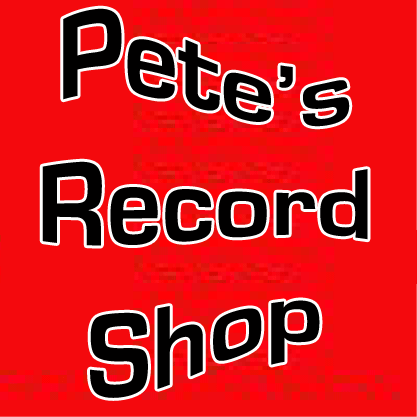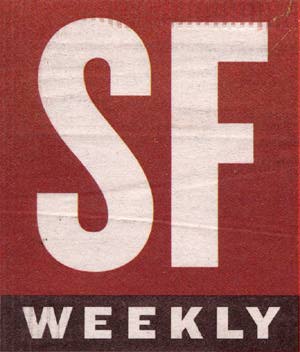| ||
There are certain musicians who are so perfectly in tune with the times that they practically define them. Elvis, Madonna, the Carpenters -- all of them truly embodied their eras. But what of those artists who are out of step with modern fashion, whose labors are far too eccentric to be popular, who can'tbe fully understood until years later? Pete Miller is one such artist. For the past 40 years, the British native and long time San Francisco resident has firmly adhered to the philosophy espoused by Danny & the Juniors: Rock 'n' roll is here to stay. He has been at ground zero for numerous musical revolutions, having toured with the Beatles, the Rolling Stones, and most of the rest of the British Invasion; released one of the first English psychedelic songs; rediscovered rockabilly; and recorded the San Francisco punk scene. Yet Miller and his nom de plume Big Boy Pete are far from household names. Why? Perhaps, as Brian Wilson once sang, he just wasn't made for these times. Miller was just a simple teenager in the English town of Norwich when he went to see Rock, Rock, Rock, a film featuring Chuck Berry. "I saw him duckwalk across the stage and itwas all over," Miller says with a laugh. ""Sorry Mum, sorry Dad, I'm not going to be that doctor you wanted.'" Soon after, Miller sold his train set for a second-hand guitar and gathered some school mates together to form the Offbeats, a quintet that played covers by early rock 'n' rollers like Berry, Gene Vincent, and Eddie Cochran. The group lasted until 1961, when Miller got lured away bya more successful local band, Peter Jay & the Jaywalkers. In a city of 100,000 people, there were only six bands; Miller was in two of them. "Back then, you were a weirdo if you werein a band; now, you're weird if you're not," Miller says. With Miller on lead guitar, the Jaywalkers scored several hits on the British charts, and began a grueling tour schedule of 300 shows a year. There were no major highways at the time -- it took 15 hours to go 350 miles -- and the band often played its own set and served as backup for solo acts. In Miller's five years with the group, the Jaywalkers toured with the Kinks, the Rolling Stones, the Animals, Dave Clark 5, the Byrds, Cream, and a certain Fab Four. "The Beatles were our friends," Miller says. "They were just another band, like us." Eventually, the Beatles asked the Jaywalkers to open for them on what became known as the Beatlemania tour. When asked about those tempestuous times, Miller leans back in his chair and smiles. "I remember we were flying to Ireland. We were on the runway and all of a sudden the pilot comes on the intercom and says, "Ladies and gentlemen, we're very pleased to have aboard the Beatles. John, Paul, George, and Ringo -- welcome to Aer Lingus!' And John stands up and yells, "Don't you mean cunnilingus?'" By late 1965 Miller had grown tired of the incessant touring and quit the Jaywalkers. His first solo single, "Baby I Got News for You," was released under the name Miller and featured Peter Frampton in the backing band. Alas, Miller's ferociously fuzzy guitar riff and Troggsy snarl -- which earned the single the arguable title of first British psychedelic tune ever -- was far too rough for the Mersey-beatrothed public. Disappointed by the rigors of the star-making machinery,Miller decided to leave London in early 1966 and return to Norwich to "churn out hits for stars" as a staff writer for a music publishing company. In an interview in Ugly Things magazine, Miller remembered that time: "I would go [to the Washington Club] five hours a night, hang around with the strippers, smoke hashish, drink barrels of beer, get in loads of trouble, and then go home and write all the songs. I'd get up the next afternoon, go to my studio and start recording them. It would happen like that six, seven nights a week; it was almost like a regimented procedure in those days." In 1968, he made one last stab at commercial success, putting out "Cold Turkey" under the name the label chose, Big Boy Pete. The song was the kind of bluesy hard rock that bands like Blue Cheer would eventually popularize; at the time, however, no one wanted to hear it. When Polydor suggested he promote the single, Miller refused, and the label hired someone else to play his songs. (Years later, when "ColdTurkey" was reissued on the Electric Sugar Cube Flashbacks compilation, people were still arguing about who Big Boy Pete really was.) From 1966 to 1969, Miller wrote several hundred songs for his company; a hundred were published and fewer than 20 were used by artists. Numbers such as "Crocogators," "A Dog Called Doug," and "Knit Me a Kiss" were deemed too bizarre by his publishing company. But they were nothing compared to World War IV, his concept album about the end of the world. Over the course of a year, Miller labored at crafting a multilayered, hallucinatory work that would stand alongside Sgt. Pepper, the Stones' Their Satanic Majesties Request, and Jimi Hendrix's Axis: Bold as Love. "I got tired of turning out pop and said,"Now I'll do something I want to do,'" Miller explains. "When I was done, I took it to the music publisher and he said, "What am I going to do with that?'" Miller had him send the bizarre "symphonic poem" to Apple, the label that the Beatles were running. John Lennon liked what he heard and wanted to put it out. "I knew I was leaving England in June and I knew I wasn't coming back so I said forget it," Miller says. "But of all the tapes of songs I made in seven years of recording, World War IV was the only tape I took with me to Bangkok." Miller and his new bandmates the News had cooked up a crazy idea: They planned to drive by land from England to Thailand. Miller had even gone as far as to write drug companies for prescription drugs and concentrated food supplies. Unfortunately, on a trial run through France, Miller and friends flipped and totaled their VW Bus. Luckily, a buddy who sold medical supplies for profit in Thailand found the band a job playing for the troops and sent them plane tickets. Miller soon began another grueling tour schedule, this time in the jungles of Southeast Asia. There were 15 to 20 bases scattered throughout the country, with three clubs on each base (enlisted, officers', noncommissioned officers'). The band would often play all three clubs in one night, then have to sleep in the village "hotel" and drive a whole day to get to the next camp. Then there was the occasional sniperfire. "It was hell, man," Miller says. "The Viet Cong got $50 for every set of American dog tags. We had to jump out of the bus a couple times. Once, we went into town looking for drugs and this drunk VC is waving his gun at us, thinking we're soldiers. Our guide kept pulling at our hair, saying, "Long hair, no GI, long hair, no GI,' and he finallylet us go. We would've been dog meat if we didn't have long hair." By 1972, Miller had had enough of the Orient. After a few months in London in the midst of a miserable winter, he headed for Hawaii, where his most recent girlfriend was waiting. They stayed for a year, until rock fever drove them to San Francisco. Many of the Jaywalkers' records had been produced by Joe Meek. The eccentric Brit -- best known for the 1962 instrumental "Telstar" -- was England's first independent producer/engineer, working out of a studio he'd fashioned himself. "He was the English equivalent to Phil Spector, "Miller says. "He really had an ear. I would hang around with him after he was done recording us -- ask questions and pick up stuff." When he settled in San Francisco, Miller implemented what he'd learned from Meek and his own recordings by putting together his own studio. For 23 years, until it closed in 1998, the small studio in a quiet courtyard off of Union Street served as Miller's livelihood. He recorded Marshall Crenshaw, Ramblin' Jack Elliott, the Chicago Jazz Quartet, local jazz and Tejano acts, and -- beginning in 1978 with the first songs of the Avengers -- tons of local punk bands. "I enjoyed working with them," Miller says, recalling the punks. "They injected life back into the scene." With punk, Miller was again on the periphery of a musical revolution, but his own albums fared no better than before. In another case of too odd, too soon, 1981's Pre C.B.S. and 1986's Rockin'Is My Biznes each came out a year before the Stray Cats and La Bamba made rockabilly and old-time rock popular again. By the 1990s, Miller was all but forgotten. Then in 1997, a copy of "Cold Turkey" sold for 400 pounds at a Sotheby's auction. David Wells, owner of British archival record label Tenth Planet, called Miller to ask if he had any unreleased tracks lying around. " 'About 200,' I said," Miller laughs. To date, Tenth Planet has issued four collections of his '60s demos, while stateside labels Dionysus and Gear Fab have released them on CD. Even though Miller dismisses these recordings as commercial drivel, the songs are well-crafted, skewed pop, suffused with strange lyrics, trippy effects, and plenty of hookah smoke. An upstate New York band, the Squires of the Subterrain, was so taken with his tunes that it is working on an album of covers. Miller himself is putting together a reunion album with the original members of the Offbeats. While the style of the album is a close-kept secret ("If you print it, I'll kill you," Miller says), I can tell you this: As usual, it is completely out of tune with the times. And World War IV, which is finally seeing release after 31 years-- well, let's just say that LSD-inspired, apocalyptic concept albums are never in vogue. "In the early '60s we had to record what we were told," Miller says. "When I was writing, I was trying to write what was popular at the time for who was looking for songs. At the end, I said, "Fuck it, I want to do what I want to do and have fun doing it.'" History, they say, is written by the winners. But Pete Miller's stories are too good to write off, even if his name hasn't gone down in the books -- yet. | ||
| Biography | Concrete Music | Discography | | What's new | Let's chat | Home | © copyright 2000 Pete Miller |


